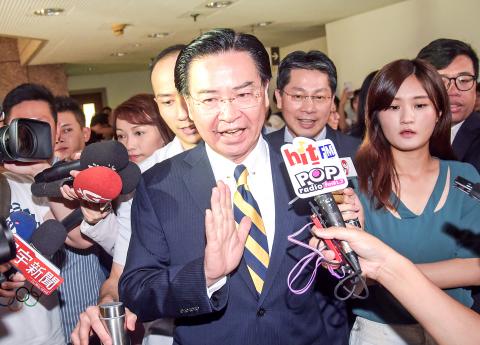The government would continue to place great importance on relations with the nation’s remaining diplomatic allies, despite growing calls to ditch them after four allies in just two years succumbed to Beijing’s promises of financial aid and severed ties with Taipei, Minister of Foreign Affairs Joseph Wu (吳釗燮) said yesterday.
Wu made the remarks at National Chengchi University, his alma mater. It was his first public appearance since he announced on Thursday evening Burkina Faso’s decision to break ties with Taiwan, becoming the fourth diplomatic ally the nation has lost since President Tsai Ing-wen (蔡英文) took office in May 2016.
“Judging from the situation at this year’s World Health Assembly [WHA], there are a lot of things we could not have done without our diplomatic allies,” Wu said, in response to a student’s question about whether he agreed that Taiwan’s diplomatic allies are unimportant because they are “tiny, poor and money-seeking.”

Photo: Huang Yao-cheng, Taipei Times
Some of the nation’s allies submitted proposals calling for Taiwan to participate at the WHA as an observer and engaged in two-on-two debates at the annual conference to advocate for its WHA bid, Wu said.
He also dismissed criticism that the nation’s provision of aid programs to its diplomatic allies are unnecessary and a waste of money.
Taiwan’s official development assistance only accounts for 0.013 percent of the nation’s GDP, compared with Organisation for Economic Co-operation and Development members, which have a target of 0.7 percent, Wu said.
“These kinds of opinions would make the government’s effort to increase that ratio extremely difficult, because it would be stifled once such assistance is labeled as ‘checkbook diplomacy,’” Wu said, adding that Taiwan’s development owes much to assistance offered by other wealthier nations in the past.
Turning to Beijing’s growing efforts to limit Taipei’s international space, Wu said the key to mitigating the problem lies in carving out a niche.
“The world is a big place and we can find a space anywhere,” Wu said, adding that the ministry’s goal is to cultivate relationships with more democratic and like-minded nations to offset pressure from Beijing.
The Chinese representation issue was also discussed after two students, one of them a Chinese citizen, asked Wu how he plans to push his government’s Taiwan-centric diplomatic policy when it was the Republic of China, rather than Taiwan, with which the nation’s remaining diplomatic allies established ties.
“Whether it is Taiwan’s diplomatic or non-diplomatic allies, what they recognize is the government popularly elected by the nation’s 23 million people. I think there is no mistake about that,” Wu said.
Sharing his optimism about closer relations across the Taiwan Strait, Wu said that, as more Chinese begin to understand and appreciate Taiwan, the Chinese government’s military and diplomatic aggression would eventually draw the ire of its people.
“I believe that one day, the people of China will become the masters of their own nation, just like their Taiwanese counterparts have done,” he added.

Chinese Nationalist Party (KMT) Chairman Eric Chu (朱立倫), spokeswoman Yang Chih-yu (楊智伃) and Legislator Hsieh Lung-chieh (謝龍介) would be summoned by police for questioning for leading an illegal assembly on Thursday evening last week, Minister of the Interior Liu Shyh-fang (劉世芳) said today. The three KMT officials led an assembly outside the Taipei City Prosecutors’ Office, a restricted area where public assembly is not allowed, protesting the questioning of several KMT staff and searches of KMT headquarters and offices in a recall petition forgery case. Chu, Yang and Hsieh are all suspected of contravening the Assembly and Parade Act (集會遊行法) by holding

PRAISE: Japanese visitor Takashi Kubota said the Taiwanese temple architecture images showcased in the AI Art Gallery were the most impressive displays he saw Taiwan does not have an official pavilion at the World Expo in Osaka, Japan, because of its diplomatic predicament, but the government-backed Tech World pavilion is drawing interest with its unique recreations of works by Taiwanese artists. The pavilion features an artificial intelligence (AI)-based art gallery showcasing works of famous Taiwanese artists from the Japanese colonial period using innovative technologies. Among its main simulated displays are Eastern gouache paintings by Chen Chin (陳進), Lin Yu-shan (林玉山) and Kuo Hsueh-hu (郭雪湖), who were the three young Taiwanese painters selected for the East Asian Painting exhibition in 1927. Gouache is a water-based

Taiwan would welcome the return of Honduras as a diplomatic ally if its next president decides to make such a move, Minister of Foreign Affairs Lin Chia-lung (林佳龍) said yesterday. “Of course, we would welcome Honduras if they want to restore diplomatic ties with Taiwan after their elections,” Lin said at a meeting of the legislature’s Foreign Affairs and National Defense Committee, when asked to comment on statements made by two of the three Honduran presidential candidates during the presidential campaign in the Central American country. Taiwan is paying close attention to the region as a whole in the wake of a

OFF-TARGET: More than 30,000 participants were expected to take part in the Games next month, but only 6,550 foreign and 19,400 Taiwanese athletes have registered Taipei city councilors yesterday blasted the organizers of next month’s World Masters Games over sudden timetable and venue changes, which they said have caused thousands of participants to back out of the international sporting event, among other organizational issues. They also cited visa delays and political interference by China as reasons many foreign athletes are requesting refunds for the event, to be held from May 17 to 30. Jointly organized by the Taipei and New Taipei City governments, the games have been rocked by numerous controversies since preparations began in 2020. Taipei City Councilor Lin Yen-feng (林延鳳) said yesterday that new measures by